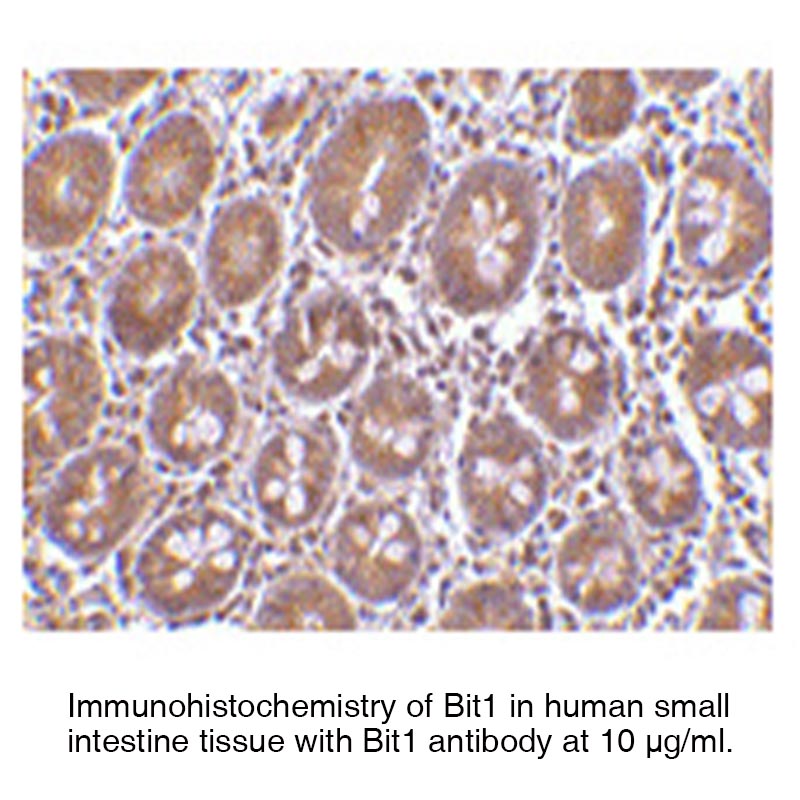Anti-Human Bit1 (Intermediate Domain)
| Code | Size | Price |
|---|
| LEI-B461-20ug | 20 ug | £199.00 |
Quantity:
| LEI-B461-0.1mg | 0.1 mg | £591.00 |
Quantity:
Prices exclude any Taxes / VAT
Overview
Host Type: Rabbit
Antibody Clonality: Polyclonal
Regulatory Status: RUO
Target Species: Human
Applications:
- Immunohistochemistry- Paraffin Embedded (IHC-P)
- Western Blot (WB)
Storage:
This polyclonal antibody is stable for at least one week when stored at 2-8°C. For long term storage aliquot in working volumes without diluting and store at -20°C in a manual defrost freezer. Avoid Repeated Freeze Thaw Cycles.
Images
Further Information
Concentration:
0.5 mg/ml
Conjugate/Tag/Label:
Purified No Carrier Protein
Format:
This polyclonal antibody is formulated in phosphate buffered saline (PBS) pH 7.4 containing 0.02% sodium azide as a preservative.
Formulation:
This polyclonal antibody is formulated in phosphate buffered saline (PBS) pH 7.4 containing 0.02% sodium azide as a preservative.
Immunogen:
PN:B492
Long Description:
Adhesion to extracellular matrix regulates cell survival through both integrin engagement and appropriate cell spreading. Anoikis is the molecular mechanism of apop-tosis induced by integrin detachment.1 Bit1 (Bcl-2 inhibitor of transcription 1) was recently identified as being involved in this process.2 Bit1 is a mitochondrial protein that is released into the cytoplasm upon onset of apoptosis where it forms a complex with AES, a small Groucho/transducin-like enhancer of split (TLE) protein and induces caspase-independent apoptosis. Both AES and TLE proteins are transcriptional co-repressors that play important roles in neurogenesis, segmentation, and sex determination.3 It has been suggested that Bit1-AES complexes turn off a survival-promoting gene transcription program controlled by TLE.2 Interestingly, apoptosis of cells transfected with Bit1 and AES could be inhibited if the cells were allowed to attach to fibronectin through the α5β1 integrin suggesting that the Bit1-AES pathway contributing to anoikis is regulated by integrins, and in particular, the α5β1 integrin.2
Target:
Bit1
References
1. Martin, SS. and Vuori, K. (2004) Biochim Biophys Acta. 1692:145-57.
2. Pai, JT. et al.(2004) Cell 116:751-762.
3. Chen, G. and Courey, AJ. (2000) Gene 249:1-16.
Related Products
| Product Name | Product Code | Supplier | Anti-Human Bit1 (NT) | LEI-B462 | Leinco Technologies | Summary Details | |||||||||||||||||||||||||||||||||||||||||||||||||||||||||||||||||||||||||||||||||||||||||||||
|---|---|---|---|---|---|---|---|---|---|---|---|---|---|---|---|---|---|---|---|---|---|---|---|---|---|---|---|---|---|---|---|---|---|---|---|---|---|---|---|---|---|---|---|---|---|---|---|---|---|---|---|---|---|---|---|---|---|---|---|---|---|---|---|---|---|---|---|---|---|---|---|---|---|---|---|---|---|---|---|---|---|---|---|---|---|---|---|---|---|---|---|---|---|---|---|---|---|---|---|



